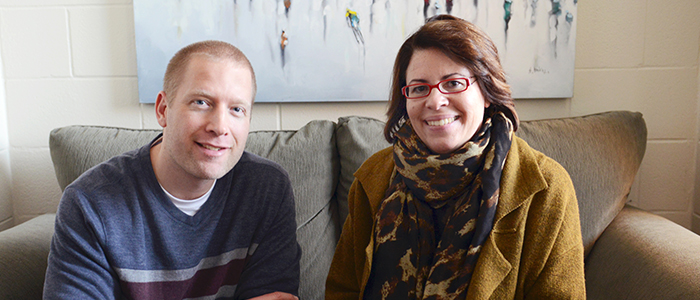Raising awareness for the traumatic, untold stories

In the past few years, there has been a steady incline in the amount of media coverage focused on post-traumatic stress disorder (PTSD) and its connection to the overall mental health and stability of those affected by it.
The story that usually revolves around PTSD focuses on the percentages of soldiers and veterans who experience the effects of the mental health condition after being exposed to combat trauma. While the military population can develop PTSD, this isn’t where the story ends.
In fact, experts argue that anywhere from 70 to 90 per cent of people will experience a traumatic event in their lifetime, and five per cent of those people will go on to develop post-traumatic stress. This stress is also a causal factor in the development of other mental health problems that are high on our radar today, such as major depression and anxiety disorders.
Drs. Paul Frewen and Ruth Lanius have dedicated their careers to helping patients who have developed PTSD, through research on the topic and clinical practice. Their work not only includes combat trauma related to people in the military, but also the types of trauma that often occur behind closed doors within the community, such as early childhood abuse and neglect, dating violence, intimate partner violence, and domestic abuse.
“We’re particularly focused on the relationship between psychological trauma history, exposure and outcomes, and we’re focused on developing measures to assess trauma history and its impact,” Dr. Frewen explained.
He added that he and Dr. Lanius look at psychotherapies and neuroscience-informed interventions such as neurofeedback, which uses real-time displays of brain activity to teach self-regulation of brain function.
Dr. Frewen made the decision to maintain a clinical practice while working on his research because he believes that in order to help traumatized patients, researchers have to understand their stories and experiences. For him, the best way to do this is to be involved first-hand in the assessment and treatment.
And his experience in clinical practice has had a significant impact on his research with respect to improvement in treatment.
“Many people who have experienced trauma don’t come forward — they don’t share what has happened and they don’t receive treatment,” he said. “But even if patients do come forward, the treatments we have, while effective for some, are often insufficient. That’s a really important way research can help inform the design of improved treatment and assessment of the problems of patients with PTSD.”
Dr. Lanius’ clinical work also impacted the direction she wanted to take with her research. With a long standing interest in neuroscience, she became curious about how neuroplastic changes were occurring in the course of recovery.
“I became interested in asking what specific brain networks are involved in leading to the distress people experience, and how our research can change some of the key brain networks to facilitate recovery, using medication and non-medication treatments,” Dr. Lanius said.
While significant efforts across the country, such as the upcoming Bell Let’s Talk Day, have helped make Canadians more aware and accepting of mental health issues, myths still remain around PTSD. The idea that developing PTSD is a sign of weakness, or that experiencing some type of trauma in a lifetime is rare, would be two of the most prominent myths.
Dr. Frewen thinks it is excellent that the stigma around mental illness is being addressed, and he hopes in the next few years to see additional emphasis on recognizing the role traumatic life events can play in mental health issues.
“The conversation right now is very much about the symptoms and the diagnoses, and less around where these things are coming from,” he said. “I think if we could also normalize and de-stigmatize the part trauma can play, it may help make coming forward easier for those patients who experience shame or a sense of personal fault about what has happened to them.”
Dr. Paul Frewen is an associate professor in the Departments of Psychiatry and Psychology. He is also the chair of the Traumatic Stress Section of the Canadian Psychological Association, and a practising clinical psychologist affiliated with the London Health Sciences Centre Mental Health Program.
Dr. Ruth Lanius is a professor in the Department of Psychiatry, and the director of the PTSD Research Unit at Western University. She established the Traumatic Stress Service and the Traumatic Stress Service Workplace Program, and currently holds the Harris-Woodman Chair in Mind-Body Medicine at the School.








